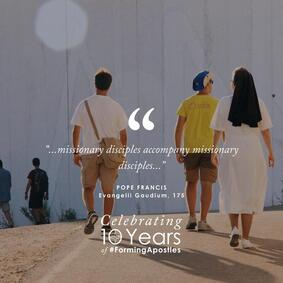
“Filled with the love of Christ, young people are called to be witnesses of the Gospel wherever they find themselves, by the way they live.” (Christus Vivit, 175)
Missionary discipleship is most fruitful through the witness of the baptized. Many are profoundly moved, particularly by the witness of young people. People often comment on who is not active in the life of faith. How often do we put our attention on those who are? These are the people, including many young people, who live their faith and go forth daily as missionary disciples of Christ. Pope Francis teaches that “missionary disciples accompany missionary disciples” (Evangelii Gaudium, 175). The baptized do not become missionary disciples on their own, they need accompaniment. This is true for young people and true for all. Young people do need accompaniment toward missionary discipleship, but that can only happen if others are well-formed disciples. Part of this formation includes learning more about ministry with young people, particularly young adults.The Center has an online course in this area that is described in an article below. Many young people evangelize others through their witness of faith in word and deed. Sometimes this is a story that is not told. They live well their faith through missionary discipleship and have brought others to Christ and his Church. They need our support, accompaniment, and prayers. May the charity of Christ urge us on! In God, the Infinite Love, Fr. Frank
0 Comments
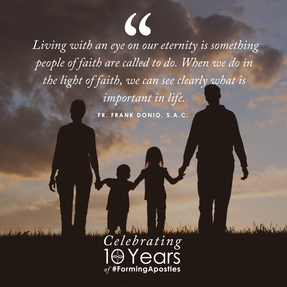 “At times family life is challenged by the death of a loved one. We cannot fail to offer the light of faith as a support to families going through this experience. To turn our backs on a grieving family would show a lack of mercy, mean the loss of a pastoral opportunity, and close the door to other efforts of evangelization.” - Pope Francis (Amoris Laetitia, 253) Each life includes death. This is obvious, but lack of consideration of the topic is part of the culture of some parts of the world, particularly the United States. Yet, death occurs. Living with an eye on our eternity is something people of faith are called to do. When we do in the light of faith, we can see clearly what is important in life. Much of our time is spent in all sorts of activities. Are these helping us grow in holiness? Do they cause us to love God and love neighbor in deeper and more profound ways? If our answer is no, then as apostles of Christ, it is time for us to reevaluate where and how we use our time on this side of life. The other side of life, eternity, will come very soon. Pope Francis also invites people of faith to assist families who have experienced death. It is a prime pastoral and evangelization opportunity, not in a heavy-handed way, but in one that accompanies people in their time of grief and beyond. If they are distant from the community of faith, the death of someone in their family offers a space for compassion, love, and care by missionary disciples of Christ. Doing it right at the time of death is good but walking with families long beyond that time is true spiritual accompaniment. May the Charity of Christ urge us on! In God, the Infinite Love, Fr. Frank Recently, I celebrated my graduation from my PhD program. As I stood in line of the academic procession, waiting for the moment to cross the stage when my name was called, I caught the eye of a former professor who was standing near me. Without saying a word, this professor reached out her hand and clasped mine, and smiled so proudly at me. Just a few years before, I encountered this smile in my professor’s office as I confided in her about my anxiety about my future, my career plans, and my relationships. My professor had listened patiently as I told her about a challenging situation I was going through, offering words of wisdom and encouragement. Since that day, my professor continued to accompany me. She often became the person I sought out for advice or guidance, always eager to draw on her own experience as a doctoral student, Catholic, and woman to help me find the next step on my path. I could not help but imagine that, on the day of my graduation as she stretched out her hands towards me, my professor remembered just how much anxiety, worry, and fear I had to navigate to get to that day. Unlike many others who just saw fancy academic regalia and a large diploma, my professor had seen the challenges that I went through that others did not understand. As she gripped my hand and smiled, my professor remembered my journey and knew the deep meaning of it. She had been with me on the journey as my professor. She was able to offer wisdom to me because she had also been on the journey herself. Today’s feast is the Feast of the Visitation, which I believe invites us to contemplate those who have been on the journeys of our lives with us, who understand so much more than others who just perceive our lives at surface level. In other words, the Feast of the Visitation calls us to consider those who live in solidarity with us, walking with us and helping us to consider the work of God in our lives. In today’s Gospel, we see the excitement of Elizabeth and the infant, John the Baptist, in her womb as Mary greets them. Though the words of the Gospel do not reveal all the details about Mary’s and Elizabeth’s conversations with one another, I like to imagine and fill in the gaps. Both women might have shared their stories with one another about their encounters with angels and miraculous pregnancies. Imagine the laughter, sighs of relief, and the words ”You, too?!” exchanged with one another in the telling of their stories. Think of what their conversations sounded like: posing questions to one another, offering insights, and asking, “What could this mean for us?” Consider what emotions both women might have felt when they recognized they weren’t isolated in their experience any longer. Though Mary had Joseph and Elizabeth had Zechariah, imagine what it must have been like to feel seen and understood by another who had also been through such a unique and particular experience. The Feast of the Visitation reminds us of a great truth that Pope Francis himself often makes reference to: that in the Christian life, we are never meant to be isolated. We are meant to be seen, known, understood, and accompanied. In Fratelli Tutti, the pope writes, “Once more we realiz[e] that no one is saved alone; we can only be saved together.” In Mary’s and Elizabeth’s case, the two women considered the mystery of what happened to them together. They were able to consider the meaning of each other’s story in a profound way because of their own separate experiences. In the moment I shared with my former professor on my graduation day, I was reminded of someone who walked with me during my years in my doctoral program, and shared solidarity with me in the struggles I navigated. Without the accompaniment of my professor, my journey would have felt isolating, with no one to share questions, experiences, and “You, too?!” with. The Visitation invites us to consider those who walk with us and bear witness to significant moments in our lives. Who is with you on your journey? Who has made you feel seen, known, and accompanied, and how are you called to be with others on their journeys?
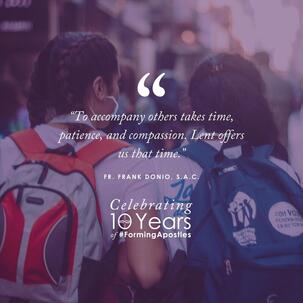 “Lent came quickly!” How often have we said or heard these words? No matter how fast it seems to come, Paul Jarzembowski in his new book, Hope from the Ashes: Insights and Resources for Welcoming Lenten Visitors, notes that, “Lent serves as an opportunity for our personal renewal toward holiness –to assess and reform our habits and routines, to mend relationships with God and others” (29). Our focus, though, is not simply on ourselves and our growth in holiness. The Lenten season offers us the opportunity to welcome and accompany others, especially those who join our faith communities, particularly on Ash Wednesday. Jarzembowski offers that “Ash Wednesday is like a laboratory for learning the ‘art of accompaniment’ (Evangelii Gaudium, 169)” (184). To accompany others takes time, patience, and compassion. Lent offers us that time. Prayer and fasting help us practice patience. Almsgiving, which includes our valuable time, helps us grow in compassion –suffering with others. Lent is journeying together, which is what being synodal is about. Many are isolated and alone; we are called to accompany them into deeper life in Christ in and through the Church. May our Lenten journey together lead us to an Easter of deeper personal holiness and greater accompaniment of all. May the Charity of Christ urge us on! In God, the Infinite Love, Fr. Frank It’s that time of year where students set off for college, some for the first time and some going far away from home. These students take on the challenge of continuing towards adulthood and the process of making their faith their own. This can be a difficult road filled with numerous temptations, stresses, and other challenges. As someone who attended Catholic school for most of my life, I found the transition to college difficult, especially when it came to my faith. I attended a large public university where few practiced Catholicism, and I felt very isolated. The people who I attended Mass with at the beginning of the year began to slowly drift away – going to other churches or becoming too busy with academic commitments. With my class schedule it was hard to make it to the Catholic Student Union events and join the camaraderie. While I adjusted well to college life, I felt alone in my faith. Everyone has different experiences when it comes to the transition into colleges. Whether you are entering college for the first time, a current student wanting to get more in tune with your faith, or even a parent or relative of a college student(s), I’ve compiled some tips about keeping up with your faith life that can be helpful: 1. Make friends who challenge you to be your best selfMake friends wherever you go on campus, but remain close friends with those who continually challenge you to be your best. Many of my closest friends at college weren’t Catholic, yet they held me to remain true to my faith and myself without peer pressure. Just as a spouse is to help his or her partner grow in faith, so too should your friends. 2. Get InvolvedWhether you join the Catholic Student Union or other groups on campus, make sure you are busy. Becoming involved lessens homesickness and other temptations. Enjoy your college experience! 3. Go to Mass every SundayMark it on your agenda. Make sticky notes. Do whatever you need to do so that you attend Mass each week. Experiencing Christ every week in the Eucharist renews us and gives us strength. Fortunately, as Catholics we usually have a variety of Mass times to attend, so take advantage of that! 4. Challenge yourself and set goalsRegularly make short-term and long-term goals, and then try to stick to them. These can be anything from attending adoration regularly, going to daily Mass, setting aside prayer or Bible-reading time, or even studying abroad, trying new foods, and accomplishing a certain academic achievement. 5. Find time every day to pray and appreciate the beauty around youDoing this helps strengthen your personal relationship with God. Plus, you gain a better appreciation for life and develop practices that will stay with you after college. It’s not easy, but it matters that you try. 6. Call your family and your close friends one or more times a weekThese people are important foundations in your life. Keep them updated on your life in college and be honest with them. Your family and friends are a support system when things aren’t easy. 7. Find a MentorYour mentor(s) can be an academic, club advisor, older student, or religious. These individuals in your life can help you navigate college, your future, and strengthen your faith. (Plus letters of recommendation and internship/job advice are certainly helpful!) 8. Talk to people at your local church and get involved in the Mass Become a part of your new parish community at college. Get to know others around you to have that “home away from home.” This will help you make good life-long friends. Plus, getting involved in the Mass helps you become ingrained in the community while deepening your faith. 9. Search for a church you feel most comfortable going toFeeling at home in your college parish is important. Find a church that makes you want to go to Mass. The nearest church may not be your favorite – so explore! My favorite parish in my college town was about 15 minutes away and felt just like my home parish. 10. Find people to go to church with you Having someone to go to church with incentivizes you to go to Mass. Plus, it’s always fun having a buddy. Keep each other accountable! Make it a group event and have brunch or dinner after Mass, too! *This post was originally published on September 8, 2014. What does it mean to be a spiritual father? For me, the answer is found in the experience of fathers that I have known or know. Some are biological fathers, others are father-figures, such as older relatives and friends, priests, and religious brothers. Each in his own way showed me how to love in a fatherly way. Spiritual fatherhood is loving universally, not particularly. The love of Christ that urges us on is one that loves all, no matter what. That is not easy to do, and I fail more often at it than I succeed. The only way that spiritual fatherhood is possible is through cooperation with the grace of Christ. A spiritual father is one who is aware of the working of grace in his life and assists others in recognizing the movement of grace in their own. Good spiritual fatherhood does not just happen. Yes, for me, after ordination to the priesthood, people started to call me “Father.” It is true that one is configured to Christ in a unique way through the Sacrament of Holy Orders. Cooperation with the grace of the Sacrament is over a lifetime, though. One grows into spiritual fatherhood, even as a priest. In the first few years of priesthood, I tried to be of service to others by being present to them in their sorrow and their joy. The most profound moments were in listening and accompanying others. I learned not to say much, but simply to be with them, to walk with them as they deepened their life in Christ. Today, my approach to spiritual fatherhood is similar, but with the experience of walking with others sometimes for many years. I have found that they choose to be in such a relationship with me, not simply as a priest, but also as one who is a flawed follower of Christ. A good spiritual father does not claim perfection, but instead is very aware of his faults and failings, as well as the grace of Christ that is working in and through him. Pope Francis offers this consideration in Christus Vivit: “An especially important quality in mentors is the acknowledgement of their own humanity – the fact that they are human beings who make mistakes: not perfect people but forgiven sinners” (246). Good spiritual fathers are keenly aware that they are “forgiven sinners.” When that is forgotten by a spiritual father, then the focus becomes on self, not on Christ. He is the one who forgives sin and gives the grace to love unconditionally and universally for he, and he alone, is God, the Infinite Love. Click here to read more reflections on fatherhood during the Year of St. Joseph.
Over the last several years of my life, I have read, studied, and written hundreds of pages about what Pope Francis meant when he said in Evangelii Gaudium that “The Church will have to initiate everyone – priests, religious and laity – into this ‘art of accompaniment’ which teaches us to remove our sandals before the sacred ground of the other” (169). However, nothing has ever taught me more about accompaniment than one of the most special people I have ever known in my life: my grandmother.
My grandmother, Edith Lauritzen, was born a second-generation Irish Catholic in 1928 in Queens, New York. She was soft-spoken but had a hearty laugh that made an appearance in most conversations. Her favorite food was Chicken Parmesan, and she taught me the first prayers I ever learned. Sometimes, my grandmother would pick my sister and me up after school and treat us to ice cream. She would ask us about our day at school, and listen generously, as if the happenings of my sister’s and my days at elementary school were the most riveting and important things she could devote her time to. I spent a good bit of my early childhood with my grandmother, and when my grandfather passed away, she moved in with my family to a small bedroom on the first floor of our home. In our house, my grandmother was a steady presence in my life; her warmth, laughter, and joy were always a comfort. I enjoyed spending time with her and would sometimes wake up early in the morning if I heard her making her breakfast of toast and coffee in the kitchen just so that I could spend time with her. As I grew up, our shared Catholic faith became a topic of frequent conversation. In middle and high school, I remember spending hours talking with her in her bedroom. My grandmother’s room was small, with space only for her bed, dresser, and an armchair. The feeling of my foot falling asleep sticks with me as I reflect on talking with her, as sometimes our conversations lasted hours as I sat cross-legged on her wooden floor. Beyond some vague memories of the topics of prayer, the lives of the saints, and my hopes to visit St. Peter’s basilica one day, I do not remember anything specific about the topics of conversation. Rather, what rises to the surface in my memory of those conversations with my grandmother is her listening, her interest in my thoughts, and her joyful, warm presence that created the space for me to speak up and share my insights with a woman with 65 more years of life experience. Now, I look back and know that I might have spoken with a little too much certainty about God and the things of faith, and probably mused a little too grandiosely about my reflections on what certain Gospel readings meant. However, that didn’t matter to my grandmother. This was the gift that my grandmother gave to me: taking my faith, questions, and thoughts seriously. My grandmother could have seen my early, inexperienced love of my faith as childish or naïve. Instead, I think she saw my faith as wisdom, blooming and in process, attempting to make sense of God and life. In front of my grandmother’s armchair and unbeknownst to us both, my vocation as a theologian and woman of faith was being nurtured and cultivated. After my first year at college, my family had to move my grandmother to an assisted living home as she needed more care than we could provide at my house. I was devastated. My home felt like it lost a little bit of warmth. However, that first summer after my freshman year of college, I made it part of my daily routine to visit my grandmother. I spent afternoons with her, listening to her thoughts and reflections on her life, her stories about growing up with the other children in her neighborhood in Queens, and her relationship with my grandfather. We laughed as she told stories about living in New York, what it was like to go to Mass in Latin, and why she loved St. Thérèse (her favorite saint). Before moving to the assisted living home, my grandmother had never lived away from home, so sometimes, she would cry. I learned in those moments that what was important was not me offering some nugget of wisdom from our faith that would help her to reframe her thinking, but for me to be there, hold her hand, and be present. In the days after those afternoons where there were more tears than laughter in her voice, I would make sure to bring her a cup of chocolate ice cream to lift her spirits. It did not take long for me to realize it was now my turn to accompany my grandmother, just as she had accompanied me in my childhood and teenage years. Two summers later, my grandmother passed away. It was one of the most painful days of my life. At the same time, I was overjoyed at the thought of my grandmother getting to experience something so much better than our hours of conversation together about our faith: God himself. At my grandmother’s funeral Mass, one of the hymns my family selected was “O God Beyond All Praising.” While the entire hymn is a perfect way to describe the gift that my grandmother was to everyone she encountered, the words of the second verse have always particularly stuck out to me when I think about her: “The flower of earthly splendor in time must surely die, its fragile bloom surrender to you the Lord most high; but hidden from all nature the eternal seed is sown - though small in mortal stature, to heaven's garden grown” In reflecting upon my relationship with my grandmother, I think about how her accompaniment of me planted seeds in my life that continue to bloom and grow. Though she was older and weaker, my grandmother passed on to me the gift of faith, a gift that is an eternal reality that we share, and that I hope will bring us together in the next life. Even when my faith was more composed of immature certainty and over-zealous explanations of Scripture, my grandmother saw more than that. And, when it was my turn to accompany my grandmother in the last years of her life, she gave me the gift of continuing to grow these seeds of faith through my own cultivation of patient listening and presence. For me, my grandmother is a model of accompaniment, and was a witness to what Pope Francis writes in Evangelii Gaudium of the listening and patience required in accompaniment: “Only through such respectful and compassionate listening can we enter on the paths of true growth and awaken a yearning for the Christian ideal: the desire to respond fully to God’s love and to bring to fruition what he has sown in our lives (171).” Through my grandmother’s love, I learned to listen to God and respond to His love. I know the seeds of my faith are continuing to grow and bloom even after my grandmother’s death as she accompanies me with her prayers. For more resources on accompaniment, please click here.
In this week’s Gospel, we hear Jesus encouraging us to “Be watchful! Be alert!” in waiting for the coming of the Reign of God. Jesus uses the image of a homeowner who first secures his home and belongings before leaving to take a trip. Because his travels take him far from his property, the homeowner is intentional about ensuring that his own property is in order before setting out for a new road and destination. We might imagine the factors that would drive his painstakingly detailed preparations: extra security to protect his home from thieves, people to check on the resources of the house to make sure that it doesn’t flood or become too drafty without anyone inhabiting it, and perhaps also to achieve a sense of his own inner peace, that he has taken an active role in protecting his property. Jesus’ parable reminds us the importance of securing our own “inner” home and taking an active role in preparing ourselves for our own journeys in life. For me, this parable brings to mind the importance of engaging in our own formation. During my time as an apprentice catechetical leader as part of the University of Notre Dame’s Echo Faith Formation Leadership Program, I was introduced to the hard work of formation. Formation is the intentional cultivation of our spiritual, human, intellectual, and pastoral qualities as human beings that allows us to live out our call to holiness in a generous and healthy way in ministry. In Echo, I entered the world of professional ministry for the first time. I learned quickly that ministry calls us to give deeply of ourselves; however, in being new to ministry, I neglected to secure my own “inner home” of my mind, heart, body, and soul before journeying out of myself to encounter others in the work of evangelization and catechesis. I was susceptible to the outside thieves of comparison, results-driven ministry, and how I could best show off my training and theological knowledge to those I served. In order to make an offering of my own life in ministry that truly served the coming of the reign of God and did not depend on my own efforts or ego, I had to learn to engage my own formation. I intentionally cultivated a life of prayer, took care in applying my studies in catechesis and ministry to my work, and reflected and healed through a relationship with a therapist. Over time, I felt revitalized and more able to cooperate with the Spirit’s work in my life and ministry because I was no longer focused on just trying to survive. Service Suggestion: In the Christian life, we are called to accompany others in the life of faith. A relationship of accompaniment is a perfect setting for formation; it allows us to lean on and learn from each other how best to imitate Jesus in our life. Is there someone in your own life, especially in difficult circumstances, who you might intentionally accompany this Advent? How can you help them secure their own “inner” house on the journey of faith through walking with them in solidarity, mutuality, and listening? Focus: Spirituality By failing at trying to minister based on my own efforts to be the most knowledgeable and most available to those I served, I learned that with the help of the Holy Spirit, I had to engage my own formation so I could be awake, alert, and ready to make of myself a healthy and holy offering. Through formation, I grew to become a minister with her house in order while being on the journey of faith and ministry, prepared to meet Jesus in those I served “whether in the evening, or at midnight, or at cockcrow, or in the morning.” How can you aim to put your own inner house in order this Advent? Are there spaces in your life where you can engage in your own formation in order to make a more generous and healthy offering of your life? Prayer God, Isaiah speaks out “Yet, O Lord, you are our father; we are the clay and you the potter: we are all the work of your hands.” We remember that our lives are the spaces where our salvation unfolds, where we are formed and shaped into art by you, the Artist of Artists. Send your Spirit upon us to be moved by those you place in our path so we may be formed in compassion, empathy, and solidarity. Strengthen us to take an active role in shaping our world to be a reflection of your infinite love through the witness of our lives. Amen.
11/19/2020 Fratelli Tutti: On Fraternity and Social Friendship - Top Quotes from Pope Francis' Latest EncyclicalRead NowOn the vigil of the Feast of St. Francis of Assisi, the saint who influenced the choosing of Pope Francis’s papal name, Pope Francis released the encyclical Fratelli Tutti on fraternity and social friendship. Beginning with the example of St. Francis himself and continuing with the parable of the Good Samaritan, Pope Francis calls the world once again to consider the common good and to strive for unity based on fraternal charity. In doing so, he reminds humanity of an important truth: that we belong to one another. In this blog series, I’ll be sharing some of my favorite quotes from the pope’s latest encyclical. May they bring you peace, hope, and joy as we continue to grow and adapt in the midst of the COVID-19 pandemic and its effects on our world. “Let us dream, then, as a single human family, as fellow travelers sharing the same flesh, as children of the same earth which is our common home, each of us bringing the richness of his or her beliefs and convictions, each of us with his or her own voice, brothers and sisters all” (FT, 8) Today I believe that many of us have forgotten to dream. We are mired down with anxiety, isolation, pandemic fatigue, stress, financial and political uncertainty, or disillusionment. In Fratelli Tutti, Pope Francis reminds us to dream and to hope. There is room for each person at God’s table. Each person brings their own gifts, talents, knowledge, expertise, experiences, and self to the world. Rather than reject our differences, it is important to acknowledge and even celebrate the richness in our human diversity. We are many parts, but one body. Let us celebrate our humanity and practice dreaming once again—of unity, of peace, of justice, of truth, of love. “Instances of racism continue to shame us, for they show that our supposed social progress is not as real or definitive as we think” (FT, 20). As several incidents within the United States have reminded our nation once more, racism is a sin which directly contradicts the truth that all people are born with equal dignity in the image and likeness of God. The sin of racism continues to be present in our world, and eliminating it involves the intentional work and learning of each person. This process includes listening to other’s stories and journeys, learning about and from history, conducting a personal examination of conscience, and intentional action to change systems and structures of racism. Pope Francis reminds us that racism is intolerable, not only among Catholics, but among mankind as a whole. “True, a worldwide tragedy like the Covid-19 pandemic momentarily revived the sense that we are a global community, all in the same boat, where one person’s problems are the problems of all. Once more we realized that no one is saved alone; we can only be saved together” (FT, 32) Although the COVID-19 pandemic has wrought havoc on the way we live, times of hardship also remind us of what’s important. Often, we re-focus on our priorities because we are reminded not to take them for granted. Many turn to faith, family, and community and are more likely to help those who are less fortunate. Practicing gratitude is an essential component of not only surviving but thriving in times of hardship. Pope Francis points out that tragedies such as COVID-19 can bring humanity together in a common bond of fraternity. Let us turn outward during this time and use our talents and resources to bring joy, love, and hope to others. “We have the space we need for co-responsibility in creating and putting into place new processes and changes. Let us take an active part in renewing and supporting our troubled societies. Today we have a great opportunity to express our innate sense of fraternity, to be Good Samaritans who bear the pain of other people’s troubles rather than fomenting greater hatred and resentment” (FT, 77) Co-responsibility is an important theme at the Catholic Apostolate Center that has been given even greater attention in the Church today. It involves collaboration from the beginning and values the important contributions each person brings to the Church and world. St. Vincent Pallotti, patron of the Catholic Apostolate Center, understood that the Church cannot thrive and spread the Gospel without the active participation of the clergy, religious, and laity. Today, Pope Francis reminds us that we all have a role to play in the renewal of the Church and world. This begins when we can accompany our brothers and sisters, stand in solidarity with those who are hurting, and bring them the joy of the Gospel. “Solidarity finds concrete expression in service, which can take a variety of forms in an effort to care for others” (FT, 115) Charity comes alive in works, just as St. Paul says, “faith without works is dead.” The Gospel is lived today through our actions—an understanding promoted in Catholic Social Teaching and exemplified through the corporal and spiritual works of mercy. It is one thing to express solidarity with our brothers and sisters, but a very different thing to walk alongside and serve them. Pope Francis is calling us to both. As we are reminded in Gaudium et Spes, “Man…cannot fully find himself except through a sincere gift of himself” (24). “Nor can we fail to mention that seeking and pursuing the good of others and of the entire human family also implies helping individuals and societies to mature in the moral values that foster integral human development...Even more, it suggests a striving for excellence and what is best for others, their growth in maturity and health, the cultivation of values and not simply material wellbeing. A similar expression exists in Latin: benevolentia. This is an attitude that ‘wills the good’ of others; it bespeaks a yearning for goodness, an inclination towards all that is fine and excellent, a desire to fill the lives of others with what is beautiful, sublime and edifying” (FT, 112) In the Christian worldview, politics, economics, culture and society must be built and exist for the common good. They are man-made structures designed to serve this purpose. In pursuing the common good, we aim to create a society in which mankind can flourish as a result of respect for every person’s inherent dignity. As St. Thomas Aquinas stated, “Love wills the good of the other.” Pope Francis echoes this truth and reminds us that willing this good is comprehensive: we must care about one another’s spiritual well-being as well as our physical well-being. When man’s fundamental needs are met—when he is cherished, nurtured, respected, fed, and rested—he is better able to “fill the lives of others with what is beautiful, sublime and edifying.” He is able to reach out and better experience and rest in the divine. To learn more about Fratelli Tutti, please click here. 11/12/2020 Holy Detachment During COVID-19: Learning from the Examples of St. Vincent Pallotti and Fr. ChaminadeRead NowIn the last few years, Stoic philosophy has had a new renaissance in our modern culture. Based on the idea that we cannot control our outside surroundings, but can control how we respond, this ancient Roman philosophy is quite appealing to the twenty-first century—especially today when very little seems to be in our control. What I have found helpful from Stoic philosophy during this time is the understanding that we cannot control other people’s actions. We cannot control whether other people maintain social distancing or wear masks. In an election year, we cannot force the outcome that we feel is best for the country. We cannot control whether we work from home, whether schools open, or even when we can see friends. It can be disheartening to see the challenges around us. But a point of convergence between Stoicism and Christianity is an understanding of detachment that reminds us that, while the world is out of our control, we can control how we respond. We can wear masks, maintain social distancing, vote, or schedule virtual meet-ups. Most of all, as Christians, we can pray—turning to the One who is in control and who invites us to use our free will to cooperate with Him. During this pandemic, I have been reminded of one of my faith heroes, Blessed William Joseph Chaminade. As a priest in Revolutionary France, he must have felt like the apocalypse was here and now. Nevertheless, he went into hiding, offering the sacraments in shuttered rooms. When he was in mortal danger, Father Chaminade fled for Saragossa, Spain, where he prayed constantly to Our Lady of the Pillar. The Blessed Mother entrusted the exiled priest to form a society of priests and brothers who worked closely with the laity to re-Christianize France. I cannot help but compare his vision to that of St. Vincent Pallotti, patron of the Catholic Apostolate Center and founder of the Pallottine order. Both men passed away on January 22, 1850. Both of these men also had the Christian understanding of holy detachment to God’s will, as well as a commitment to cooperating with God’s grace to further build up the Kingdom. Rather than complain or say "woe is me," they saw that the world around them needed to change—beginning with themselves. They humbly realized that they could not do this alone, but rather relied on the strength of God: Father, Son, and Spirit. Learning about both of these men and living in a time with many similarities to that of Pallotti and Chaminade, I feel like my time at the Catholic Apostolate Center as an intern has been encouraging. I see the continuity of the spirituality of St. Vincent Pallotti and a convergence with some of the ideas of Father Chaminade. The Center, like these two holy men, promotes the collaboration of the laity and the clergy in building up the church and affirms that all the baptized are called to personal holiness. My internship with the Center has reminded me that life does get tough, but we have a bona fide solution: Jesus Christ. We can do little by ourselves, but when we unite with the Body of Christ, we come together through His inspiration and our actions are multiplied. I am proud to be an intern at the Catholic Apostolate Center, which lives out the rich tradition of the Pallottines. We are all on mission, working in the vineyard of the Lord. As servants of the Greatest Servant, we are called to walk with each other as we work. Through coffee breaks, check-ins, and many kind emails, I feel I am being accompanied—even during this strange work-from-home scenario. I know that my work with COVID resources and social media will not transform the world overnight, but working with a community of people who put Christ first can and will make waves. Our faith, especially as lived out in the persons of Chaminade and Pallotti, encourages us to come close to the Father, Son, and Spirit, who bring our humble work to new heights. One of the things I love about Catholicism is that we celebrate the mysteries of our faith in a physical way. Going to Mass, kneeling, standing, singing, receiving the Eucharist, hearing and proclaiming the Word of God, experiencing community after Mass or at parish events. Some of our liturgical feast days even emphasize the physical contact between us and the Divine. Think of reverencing the wood of the Cross on Good Friday or participating in a Eucharistic procession on Corpus Christi. Our faith is incarnational, and our bodies are important conduits for worship. That’s part of the reason the last several months have been so difficult for so many. These physical elements of worship have been—largely—unavailable to us because of COVID-19 and the practice of physical and social distancing. Most of us have also been physically disconnected from our communities of faith, friends, and family. We’ve missed important events like birthdays, retirement parties, and even funerals. The emotional, spiritual, and psychological effects of this separation are very real and very serious. And it’s been clear from the outset of this pandemic that the Church must take action to alleviate the impact of isolation, despair, and loneliness caused by this pandemic. But who will lead the charge? I find myself asking, what is the Church going to do about it? How will we get through this? And then I realize, the Spirit is calling me. And, friends, the Spirit is calling you too. We’re not being called to wait around while someone else figures it out. God is calling us to figure this out together. We must remember that we are the Church on earth, and we are being invited by the Spirit to cooperate with God’s grace to take action and serve others, right now. We can’t simply wait for someone else to help. Those of us who are baptized are called to be missionary disciples and, ultimately, saints. And this call comes with a personal responsibility to recognize that all our lives are interwoven as branches grafted onto the Vine, as various parts of one Body (1 Corinthians 12). We are connected to one another through our baptism into Christ. Paul says, “The body is not a single part, but many.” And because of this interconnectedness, when one part suffers, the whole body suffers. So, we’ve got to do something about that, because we’re called to be “doers”. We are all suffering in some way during this pandemic. It’s not even possible to downplay that. And we all feel one another’s burdens. We especially feel our personal stresses and anxieties, day in and day out. I believe one of the answers to this anxiety and suffering is the beautiful work of spiritual accompaniment. The call to spiritual accompaniment is incarnational and based on the love of Christ. Spiritual accompaniment urges us out of our own interior world and presses us to walk with our brother or sister in whatever situation they might find themselves. Pope Benedict XVI says that God’s love for humanity is so strong that “it turns God against himself, his love against his justice” (Deus Caritas Est, 10). How, then, can we demonstrate a reflection of this great, personal love to one another if we can’t be physically present to one another? I believe we must be creative and find ways to communicate our companionship to one another in meaningful ways. We can allow ourselves to be challenged by these questions while we reflect on this topic: Do I have the ability to be present to my suffering neighbor in any way today? Do I have the capacity to do charitable spiritual accompaniment during this pandemic? I believe one effective way to spiritually accompany others as we remain physically distant is to ask challenging questions of others and engage in honest conversation. Though this may seem simple, “faith sharing” is a powerful way to be witnesses of God’s presence, and we all need to be reminded of God’s presence these days. I think there are two simple, penetrating questions that can start fantastic spiritual conversations that open our eyes to the great works of God. They are:
The answers to both of these questions reveal our hearts, our spiritual yearnings, our joys, and our sorrows; the answers to both of these questions lead us to recognize God’s presence among us, either by contemplating where we’ve seen God or petitioning His aid through prayer. I want to challenge you to invite a friend or someone you’re close with to consider these questions and then to hear their answers. Perhaps you’ll be surprised at the way the Spirit guides the conversation. I believe that through this simple practice of spiritual accompaniment, we will grow closer with one another, though distance or politics or ideologies may keep us apart. Loving and holy conversation is one way to begin healing the wounds caused over these last several months, and it is one way to accompany one another on the road as we travel strange, new paths together. To learn more about spiritual accompaniment, please click here. For more resources to deepen your faith during COVID-19, please click here.
Amid a time of challenge and difficulty, joy makes appearances in many ways. Recently, several Catholic Apostolate Center staff members and collaborators deepened their baptismal call through Ordination to the Priesthood and Marriage. We also celebrated the Baptism of the child of one of our staff members. The child is named Vincent for St. Vincent Pallotti. In every case, these celebrations were delayed and greatly reduced in size due to the pandemic, but the joy of these days found in the hope of Christ was evident in every one of them. Fr. Alex Boucher, a staff member during the first years of the Center and a current collaborator, was ordained to the priesthood for the Diocese of Portland (Maine). Hally Moreno, Marketing Coordinator, celebrated her marriage to Benny Morales. Center Collaborator, Fr. Joseph Hubbard was ordained to the priesthood for the Archdiocese of Boston. Vincent Scott Pierno, son of Senior Consultant, Chris Pierno, and blog contributor, Krissy Pierno, was baptized. His godfather is Fr. Alex Boucher. At each of these events, Center team members participated in the liturgies as part of the accompaniment that is our hallmark and rooted in the charism of St. Vincent Pallotti. We had accompanied them in their discernment and joined in the celebration. They all live their lives as apostles of Christ and witness to others not only through their particular vocation in life, but also in their support of one another. Such spiritual friendship was part of the life of St. Vincent Pallotti and is an aspect of the Catholic Apostolate Center that is intrinsic to our apostolic work. We support one another in prayer and in our lives in Christ. Each will do this in a unique way, but we are all called to accompany one another in life and in faith. May the Charity of Christ urge us on!
As a child, I played a favorite game with my friends called “follow the leader” where everyone did exactly as the name suggests – followed the leader. If you didn’t do what the leader did you would be eliminated from the game. This game correlates to the Christian life: when we follow Jesus and do what He did, we reach our heavenly destination. We are wise to remember and heed Matthew 18:3-4: “Unless you become like children, you will not enter the Kingdom of heaven. Whoever becomes humble like this child is the greatest in the Kingdom of heaven.” How important it is as an adult Christian to always have the willing mindset of a child – to follow the leader with joyful expectation and simple trust. This reminds me of a remarkable event in my life that illustrates this concept. Several years ago, when our four youngest children were still living at home, we embarked on one of our family camping vacations. Having a large family, we had chosen camping as a way to enjoy a vacation together while on a budget. It removed all the distractions of our life of modern conveniences and afforded us time in the great outdoors to relax and build memories. This particular adventure took us to Cloudland Canyon State Park on Lookout Mountain, on the border of Georgia and Tennessee, a glorious place high in the mountains with astounding stargazing at night and amazing hiking trails during the day. One day we chose to traverse the Waterfalls Trail. The sign at the trailhead read “Steep grade ahead, use caution. Stay on marked path.” That should have been my moment of truth, my opportunity to bail and choose to sit on a bench and enjoy the 1780 ft vista and await my family’s return. But I ignored the queasiness in my stomach and forged ahead with them as they vivaciously marched down the canyon on a slim, winding trail. My stomach began to ride higher into my chest, my breathing was becoming fast and bordering on gasping and my feet were becoming heavy and unsure on the many twists and turns. After we passed under an enormous rock overhang, my body halted and I literally could not take another step. I was paralyzed with fear. Did I forget to mention, I’ve suffered from overwhelming fear of heights ever since I was a teenager? It was alive and acutely crippling on this day. As I watched my children bounding ahead and walking precariously near the rim of the steep trail, the fear gripped me to the point of panic. My husband kept telling me to look ahead, not down, and to follow his footsteps so that I would be safe and secure. The more I thought about moving forward, the stiffer I became. Moving at all in this way was sure to make me more apt to stumble. On my own steam, I could not go any further. I was at an impasse. With wisdom and child-like trust, my husband gathered our children all around me and asked each of them to lay their hands on me and to pray for all fear to cease so that I could be free to walk with joy and confidence. They did not want to leave me behind or to turn around and abandon the hike to the waterfalls. After several minutes of prayer, my breathing slowed to normal, my heart stopped racing, I unclenched my fists, and my legs relaxed. I felt a distinct release of tension in my body and my mind – so much so that I knew that I could resume the hike without fear. It was a healing miracle I claim to this day, as I can now hike steep mountains and enjoy magnificent views from heights that I could not before. My husband and children were instruments of faith who infused the peace of Jesus into me so that I could follow the leader and enjoy the boundless beauty nature had to offer on that hike. Later that night, my husband commented that Jesus healed me and gave me sure feet to traverse the steep path with assurance. I will never forget that manifestation of God’s love for me and I am willing to continue to follow the leader on all the paths He takes me because I know He will give me strength and guidance every step of the way. I am comforted by the instruction in Matthew 7:13-14 where Jesus says: “Enter by the narrow gate, since the road that leads to destruction is wide and spacious, and many take it, but it is a narrow gate and a hard road that leads to life, and only a few find it.” As humans, we cannot find and walk this path on our own. We need a leader, but we also need to be aware of all the people God places in our lives who provide guidance and leadership when we need it. It is part of the mystery and beauty of living in community with others in this life. If I had not yielded to the assistance of my family, I would have remained in bondage to crippling fear. I received help to navigate off the wide road of self -doubt and irrational panic that is destructive. With simple child-like trust and prayer, I was able to stay on the narrow path that led to a glorious adventure and freedom! My prayer is that each of us practices the obedience of following the leader so we can navigate the path that leads us to eternal peace. It is certain to be rough, but instruction is always available to us. We have to be humble and have child-like trust to adhere to the direction He provides. “Whoever wishes to come after me must deny himself, take up his cross, and follow me.” Matt. 16:24 In high school we had a religion teacher, named Mr. Matthews, who used to tell us not to worry about memorizing anything from his class but these words: “Love God with your whole mind, heart, soul and strength. Love your neighbor as yourself.” He would say, “If you come back and see me twenty years from now, I’ll be happy if those words are all you remember.” Mr. Matthew’s motto was inspired of course by Matthew 22:34-40, which happens to be today’s Gospel reading for the [Optional] Memorial of Saint Louis of France. In this text, Jesus clarifies that love of God and love of neighbor are the two greatest commandments on which everything else depends. To put in another way – without love, we are nothing (1 Corinthians). The pandemic has shown just how much we need this love in our world. And while it may be challenging to connect with one another right now, there are still ways we can share love with others from wherever we happen to be. Three Small Ways of Loving God
Three Small Ways of Loving Neighbor
Remember also, we are called to “love your neighbor as yourself.” During this unique and challenging time, are you taking care of your own spiritual, emotional, and physical needs? If you aren’t sure, it may be worth spending some time today writing down a short list of ways you can practice healthy self-care. If you liked this article, be sure to check out “Living the Corporal and Spiritual Works of Mercy During COVID-19” and “Mental Health and Coronavirus.” Recently, my husband and I attended a virtual Catholic Marriage Summit called, “Joyful Ever After.” Several of the speakers mentioned the importance of cultivating the virtue of believing in your spouse’s best intentions rather than assuming ill will when a perceived grievance is committed. I thought back to a time when my husband and I were dating long-distance. He texted me that he would be arriving late to see me, which was very unlike him. I was a bit sassy in my response. What I didn’t realize at the time was that he was late because he ran into traffic while buying me a surprise bouquet of flowers. A podcast I listen to addressed this same predicament when we interpret our children’s actions before we know their true intentions. The mom on the podcast shared how terribly she felt after becoming upset with one of her children for making a mess of crafting supplies only to find out her child brought out the materials to make her a love note. Encounters like these provide us with opportunities to choose love. Making up stories in our minds that may not be—and most of the time are not—true does more harm to our relationships than good. Assuming good intentions from our spouses, family, friends and co-workers allows us to foster and strengthen relationships. Doubting someone else is a way of protecting ourselves. God is the one who gives us courage to trust others and give them the benefit of the doubt. Being less defensive makes others more receptive. Opening ourselves up to another allows us to share the hope and joy of the Gospel. We become more likeable, less distracted by imagined problems, focused on the actual issue, and are overall happier. After all, God gives us a second, third, fourth and ultimately infinite chances in response to our shortcomings. As James 2:13 says, “For the judgment is merciless to one who has not shown mercy; mercy triumphs over judgment.” Training our minds to think of others and the best intentions they have can both help us and improve our relationships. In many occasions, the person we are interacting with may be reacting from a previous interaction that overflows into our relationship with them. By keeping an open mind without judgement, we allow the Holy Spirit to enter our hearts so that we may reach out to the other with empathy and love. This serves as a reminder to us of our own humanity and imperfection. Believing in another person’s best intentions is an act of faith. To foster this line of thinking in my own marriage, every day I try to share something I’m thankful for about my husband. I try to think about this during prayer as well to help develop gratitude. When I don’t understand something that my husband is doing or has done, I try (very hard!) to ask open-minded questions in order to open dialogue instead of shutting the conversation down or arguing. Some other ways we can seek to see the best intentions in others are: asking for clarification, listening to what’s being said rather than waiting to share our own thoughts, and refraining from editorial comments that could aggravate the situation. During these unusual times, we could all benefit from more compassion and grace. Let us open our hearts and minds to seeing the best in others. For more resources on Marriage and Family, please click here. For more resources to accompany you through this time of COVID-19, please click here. |
Details
Archives
July 2024
Categories
All
|
About |
Media |
© COPYRIGHT 2024 | ALL RIGHTS RESERVED

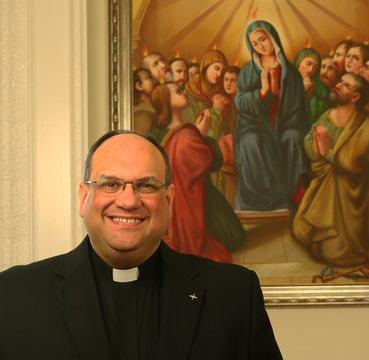
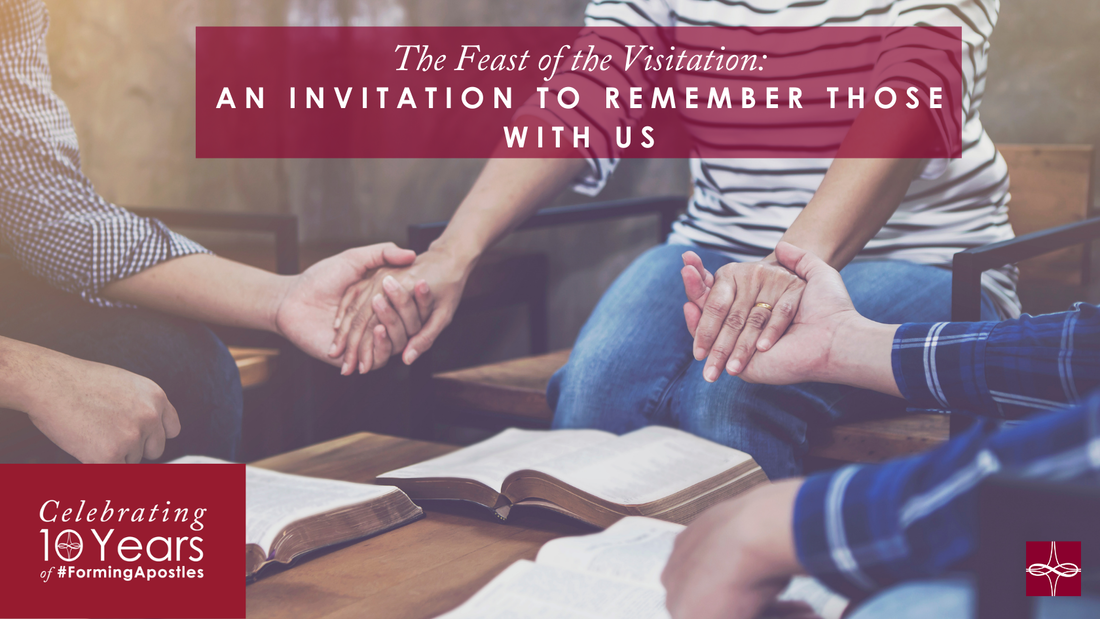
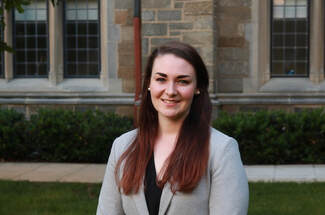

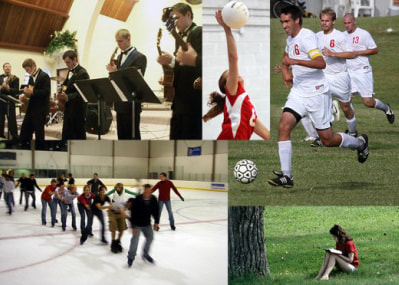
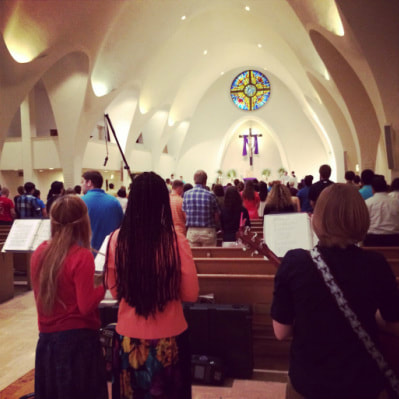



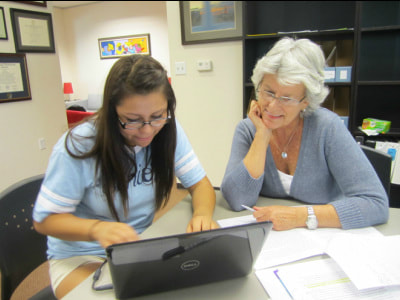
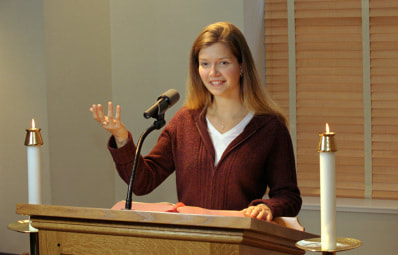
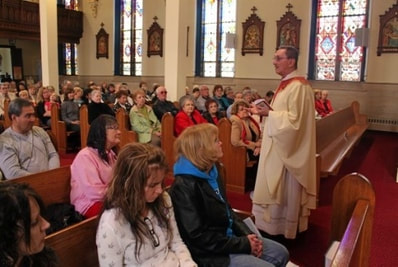
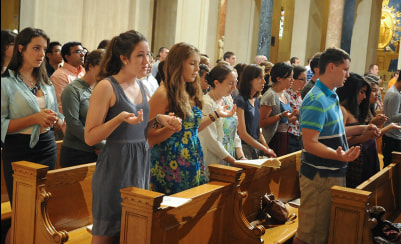

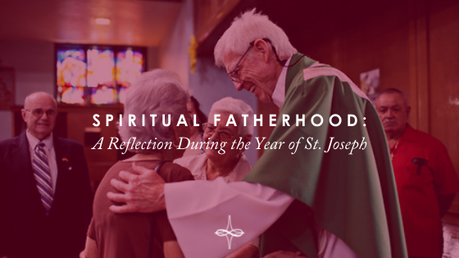
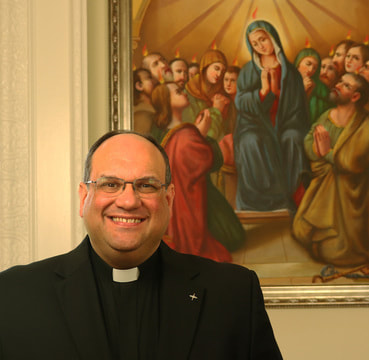


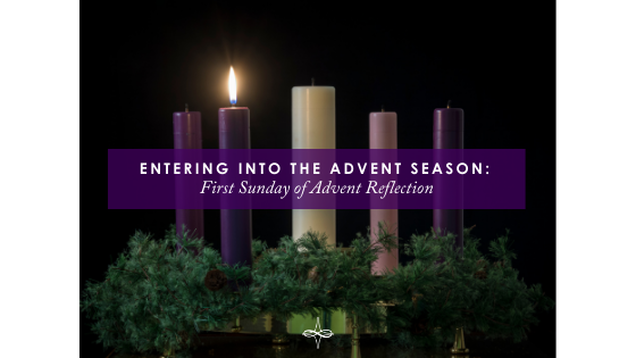

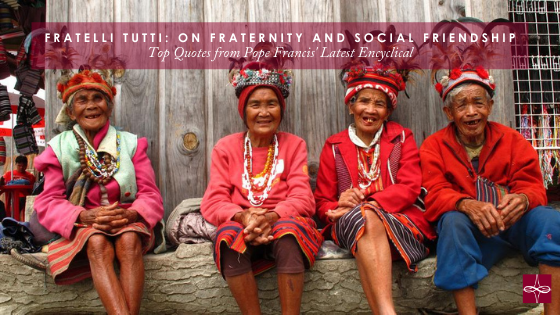

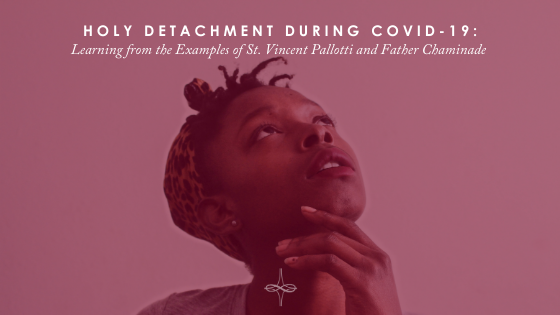
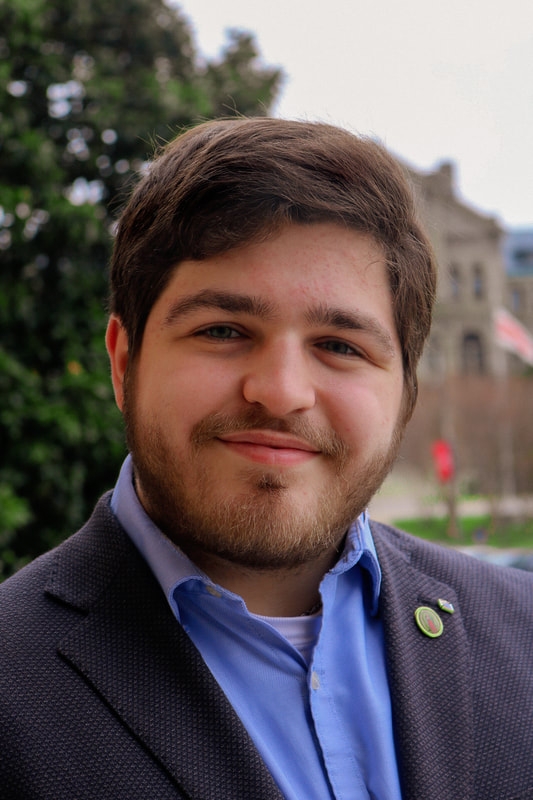
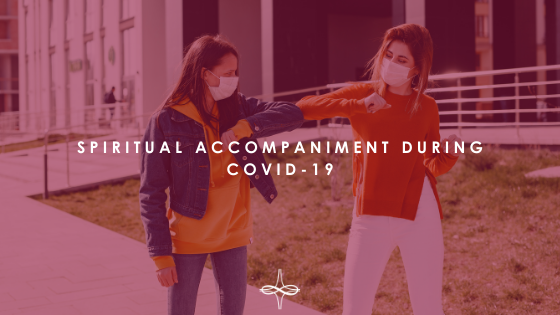

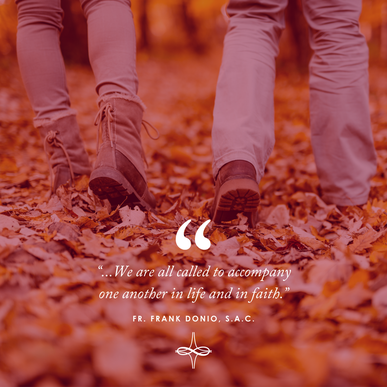






 RSS Feed
RSS Feed